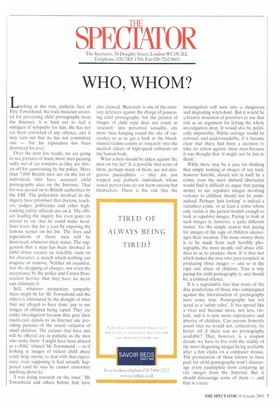WHO, WHOM?
Looking at the wan, pathetic face of Pete Townshend, the rock musician arrested for possessing child pornography from the Internet, it is hard not to feel a smidgen of sympathy for him. He has not yet been convicted of any offence, and it may turn out that he has not committed one — but his reputation has been destroyed for ever.
Over the next few weeks, we are going to see pictures of many more men peering sadly out of car windows as they are driven off for questioning by the police. More than 7,000 British men are on the list of individuals who have accessed child pornography sites on the Internet. That list was passed on to British authorities by the FBI. The policemen involved in the inquiry have promised that doctors, teachers, judges, politicians and other highranking public officials are on it. The officer leading the inquiry has even gone on record to say that he could make headlines every day for a year by exposing the famous names on his list. The lives and reputations of those men will be destroyed, whatever their status. The suggestion that a man has been involved in child abuse creates an indelible stain on his character, a stench which nothing can disguise or remove. Neither an acquittal, nor the dropping of charges, nor even the acceptance by the police and Crown Prosecution Service that they have no merit can eliminate it.
Still, whatever momentary sympathy there might be for Mr Townshend and the others is eliminated by the thought of what they are alleged to have done: pay to see images of children being raped. They are under investigation because they gave their credit-card details to an Internet site providing pictures of the sexual violation of small children. The excuses that have and will be offered are as pathetic as the men who make them: 'I might have been abused as a child,' whined Mr Townshend — as if looking at images of violent child abuse could help anyone to deal with that experience, even supposing it had actually happened (and he says he cannot remember anything about it).
'I was doing research on the issue,' Mr Townshend and others before him have also claimed. 'Research is one of the statutory defences against the charge of possessing child pornography, but the perusal of images of child rape does not count as 'research' into perverted sexuality, any more than hanging round the site of carcrashes so as to get a look at the bloodstained victims counts as 'research' into the medical effects of high-speed collisions on the human body.
What action should be taken against the men on the list? It is possible that some of them, perhaps many of them, are not dangerous paedophiles — they are just warped and pathetic individuals whose sexual perversions do not harm anyone but themselves. There is the risk that the investigation will turn into a dangerous and degrading witch-hunt. But it would be a bizarre inversion of priorities to use that risk as an argument for letting the whole investigation drop. It would also be politically impossible. Public outrage would be colossal, and understandable, if it became clear that there had been a decision to take no action against these men because it was thought that 'it might not be fair to them'.
While there may be a case for thinking that simply looking at images of any kind, however horrific, should not in itself be a crime, even the most diehard libertarian would find it difficult to argue that paying money to see repulsive images involving violence to children should not be criminalised. Perhaps 'just looking' is indeed a victimless crime, or at least a crime whose only victim is the person foolish enough to look at repulsive images. Paying to look at such images is, however, a quite different matter, for the simple reason that paying for images of the rape of children encourages their creation. The more money there is to be made from such horrible photographs, the more people will abuse children so as to produce them. It is that fact which makes the man who pays complicit in producing those images — and so in the rape and abuse of children. That is why paying for child pornography is, and should be. a criminal offence.
It is a regrettable fact that many of the dire predictions of those who campaigned against the liberalisation of pornography have come true. Pornography has not acted as a 'safety valve'. It has spread like a virus and become more, not less, violent, and it is now more exploitative and abusive of children. Can anyone honestly assert that we would not, collectively, be better off if there was no pornography available? That, however, is a utopian dream: we have to live with the reality of the most disgusting images being available after a few clicks on a computer mouse. The prosecution of those known to have paid for child pornography won't discourage every paedophile from conjuring up vile images from the Internet. But it should discourage some of them — and that is a start.


























































 Previous page
Previous page